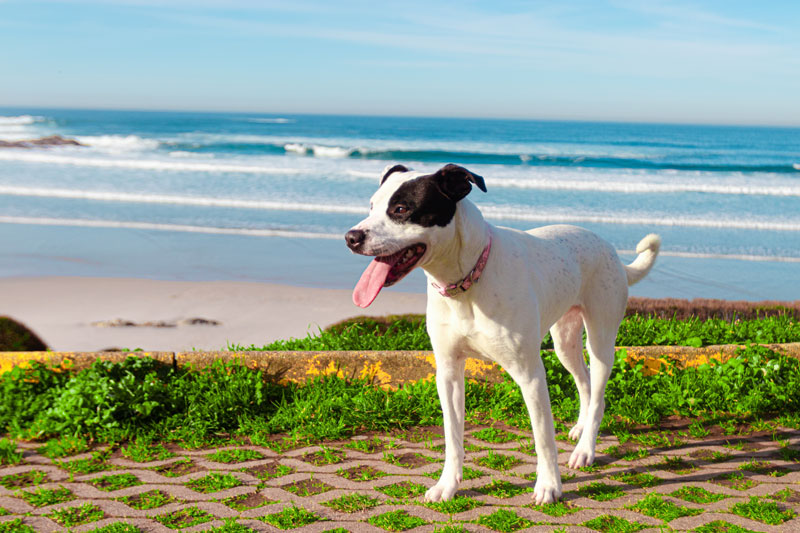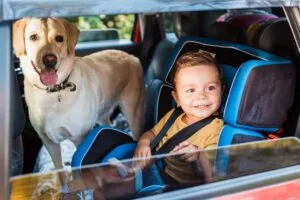June is National Pet Preparedness Month

June is National Pet Preparedness Month
This month, timed for the first month of hurricane season, urges people with pets to make preparations in case they should be hit by a disaster. That includes making plans for what you would do with your dog in case of a hurricane, tornado, flood or other natural disaster. In an emergency, your pets will be even more dependent on you for their safety and well-being. Learn what to do to keep your beloved pets safe!
Assemble an Emergency Kit for Your Pet
Keep items in an accessible place and store them in sturdy containers so that they can be carried easily.
Prepare an emergency kit for your pet ahead of time.
- Purchase a pet carrier for each of your pets (write your pet’s name, your name, and contact information on each carrier).
- Food and water for at least 2 weeks for each pet
- For cats: litter box and litter
- For dogs: plastic bags for poop
- Medications for at least 2 weeks
- Medical records, including records of vaccination for rabies and other diseases, prescription medications, and medical history.
- Sturdy leashes or harnesses
- Microchip number
- Contact information (cell phone, work phone, home phone) of owner and close relatives or friends.
Create an Emergency Plan for Your Pet
The best way to protect your household from the effects of a disaster is to have a disaster plan. If you are a pet owner, that plan must include your pets. Being prepared can save their lives. If you have to evacuate your home during a disaster, the best way to protect your pets is to evacuate them too. If it’s not safe for you to stay behind then it’s not safe to leave pets behind either.
- Know which hotels and motels along your evacuation route will accept pets in an emergency. Call ahead for reservations if you know you may need to evacuate. Ask if no pet policies could be waived in an emergency.
- Most American Red Cross shelters cannot accept pets because of health and safety concerns and other considerations. Service animals that assist people with disabilities are allowed in Red Cross shelters.
- Know which friends, relatives, boarding facilities, animal shelters or veterinarians can care for your animals in an emergency. Prepare a list with phone numbers.
- Although your animals may be more comfortable together, be prepared to house them separately.
- Include your pets in evacuation drills so that they become used to entering and traveling in their carriers calmly.
- Make sure that your pet’s vaccinations are current and that all dogs and cats are wearing collars with securely fastened, up-to-date identification. Many pet shelters require proof of current vaccinations to reduce the spread of disease.
- Consider having your pet microchipped by your veterinarian.
How to Keep Yourself and Your Pets Healthy During a Disaster
- Wash your hands after handling your pet, its food, or its waste.
- Do not let your pet lick your face or hands.
- Keep your pets up-to-date on all vaccinations and heartworm, flea, and tick preventatives.
- Practice safe handling of your pet, because your pet may behave differently during a stressful situation.
- Keep your pet in a carrier or on a leash.
- Do not allow your pet to interact with other animals, especially wildlife and stray animals.
- Report any bite wounds to medical personnel immediately.
- Properly clean and disinfect cages and litter boxes. Wash your pet’s bedding regularly.
- Avoid stagnant water, especially after flooding occurring after natural disasters.
- Don’t allow pets to play in or drink contaminated water.
After an Emergency
After an emergency, familiar scents and landmarks may have changed. Pets can become confused and lost, so it’s important to keep pets on leash or in a carrier when they’re being transported or when you go outside. Some hazards to be aware of for pets and people include snakes and other wildlife, especially after flooding, and downed power lines.
- Check your home for sharp objects, spilled chemicals, and exposed wiring to protect your family and your pets from injury.
- The behavior of animals may change dramatically after a flood, flash flood, thunderstorm, or hurricane. Normally quiet and friendly animals may become irritable.
- Monitor animals closely and only release them in a safe and secure environment.
- Contact a veterinarian if you notice any signs of stress, discomfort, or illness in your pets.
Share This Post
Recent Posts
About Shallowford Animal Hospital
Shallowford Animal Hospital and The Pet Spa at Shallowford are dedicated to the exceptional, compassionate care your pet deserves. Pets hold a very special place in our families, and we treat yours like our own.



